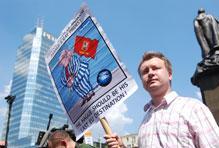For the sixth year, Moscow city authorities have given the thumbs down to gay rights activists’ application for a Pride march, flouting a European Court of Human Rights ruling that previous bans violated the European Convention on Human Rights.
And as has become the norm, Nikolai Alexeyev and his fellow Moscow Pride activists refuse to back down, saying there will be a march, as scheduled.
“We will stage our event on Saturday, May 28 as planned,” Alexeyev told Xtra in a May 21 email. “We will defy the illegal ban, and this year more than ever we are not scared of any arrest; we will face any legal consequences,” he added. “Any incident will be under the responsibility of the illegal and irresponsible decision taken by the city hall.
“It is important that everyone understand that this year the side of the law changed,” Alexeyev continued. “We are right and they are wrong.”
Alexeyev says he’s appealed the ban but doubts a Russian judge will “ever be courageous enough to apply the law,” even though the European court’s decision is binding and “prevents a Russian court from banning Pride.”
Alexeyev says he also expects even greater opposition to the May 28 event, noting that the city allowed a 1,000-strong anti-Pride protest to proceed in front of the European Union embassy on May 21, the very location Moscow Pride chose for its May 28 march.
He says city hall is also allowing a march against sexual perversion this week — “instead of our Pride.”
Alexeyev noted it’s business as usual at city hall, despite the sacking of former mayor Yury Luzhkov, who has referred to gay parades as “satanic” and gays as “weapons of mass destruction.” Sergei Sobyanin, a former chief of staff to Prime Minister Vladimir Putin, was appointed mayor in Luzhkov’s stead.
“No mayor will engage a dialogue on gay rights or any other civil society issue,” Alexeyev noted. “Having said that, I had informal discussions with a couple of people in the city hall on the Pride issue. They are very relaxed about it and would prefer that our event is authorized because that would give them less work and trouble,” he added. “When we submit tons of applications, when we introduce tons of complaints in court, we are giving extra work to these people.”
Alexeyev hopes various European embassies show support for Pride “to show to the city hall and the government that both must respect the international treaties they ratified.”
In the past, they have refused because there was “no court decision” backing up the fight of gay activists, he said.
“This year, this is the case,” Alexeyev pointed out. “We wrote to the embassies of France, Sweden, Norway, Netherlands and UK because these countries are active in the area of LGBT rights at the international level.
“We hope to get some kind of action from them like a joint statement of support.”


 Why you can trust Xtra
Why you can trust Xtra


